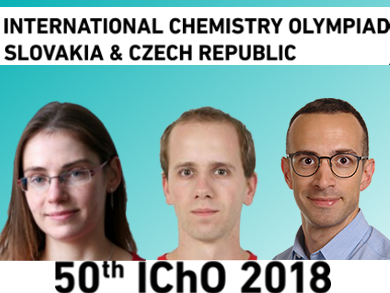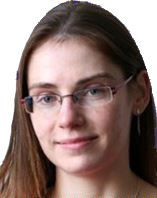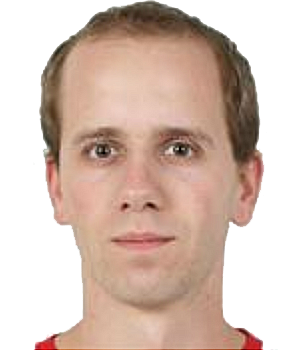The 50th International Chemistry Olympiad (IChO50) was co-hosted by the Czech Republic and Slovakia in July. 300 secondary school students completed two challenging five-hour chemistry exams—a theoretical and a practical exam.
A team of 30 authors spent two years developing and refining these practical and theoretical problems. Three members of this team, Dr. Petra Ménová (pictured left), University of Chemistry and Technology, Prague (UCT Prague), Czech Republic, Dr. Erik Szabó (pictured right), Comenius University, Bratislava, Slovakia, and Ondřej Šimůnek (pictured middle), UCT Prague, spoke to Dr. Kim Meyer for ChemViews Magazine about their experiences and motivations.
What got you interested in the IChO50?
Ondřej Šimůnek: I have been participating in the Chemistry Olympiad for many years, at first as a competitor. Honestly, I fell in love with this competition and all the amazing people involved in it. During my university studies I got the opportunity to write some problems for our National Chemistry Olympiad, and when there was a call for authors for the IChO, I was sure right away that I would love to participate.
Erik Szabó: In the past, I also was a participant at IChO, and as soon as I had the opportunity to become involved in the Chemistry Olympiad as an author I did. From the beginning, I was involved mainly in preparing practical tasks in physical chemistry. After several years of good experiences, I was offered to head the Team that would prepare practical tasks in physical chemistry for the 50th IChO.
Petra Ménová: I myself competed at two IChOs—2004 in Kiel, Germany, and 2005 in Taipei, Taiwan. I have been involved in the National Chemistry Olympiad ever since I started studying at university. I worked as an author and reviewer of the competition tasks. Furthermore, I supervised and mentored secondary school students who took part. I was a Czech team mentor in 2014 in Vietnam and a head mentor in 2017 in Thailand.
I would say this is something very special about the Czech author team. We are very young—average age 34. Most of us participated at IChO as competitors, and we are good friends.
What has been the most interesting part of the experience and what the most challenging for you?
Petra Ménová: As the Czech Scientific Committee (SciC) head, I have supervised all Czech authors. The greatest challenge was trying to solve and review all the problems from different fields of chemistry.
Although it is a lot of work, I have loved every part of it. I needed to refresh my knowledge from the early university years, I improved my communication, reviewing and editing skills, and I worked with great people, which has brought a lot of fun.
Erik Szabó: I am very happy that we managed to bring attention to underappreciated topics. Our practical problems were built around chemical oscillators, which are fascinating, but not easy to work with quantitatively. Our ambition was to offer new solutions.
Ondřej Šimůnek: The discussions about the problems with the co-authors and the process of “refining” the questions was interesting and challenging. By now, I have about 15 versions of some problems. It is great to see the difference from the very first draft up to the final version.
The questions cover a wide range of subjects and are placed in the context of the hosting countries’ histories and geography. Please explain the process for writing and vetting these questions.
Petra Ménová: Before starting to write the problems, we met several times for a brainstorming. During the first meeting, we listed over 100 topics related to Czech and Slovak science, history, culture, and geography. We then narrowed the list and worked on the ideas more in detail. As I have already mentioned, we are good friends, so communication was really easy.
Ondřej Šimůnek: The most difficult part is to come up with the idea itself. We discuss it with co-authors and at last the task is sent to reviewers. In general, each problem needs a lot of editing to make it as good as possible.
In the IChO regulations, it states: “When solving tasks from quantitative analytical chemistry competitors must receive the same substances but with different concentrations.” With 300 pupils attending, this regulation suggests quantitative practical tests are student-specific. A small army of technical staff must be supporting the event to prepare so many unique test materials.
Erik Szabó: Actually, this does not mean a different concentration for everyone, just enough different concentrations, so that the students, who are next to each other in the lab, cannot copy their neighbor’s results. Still, there is an entire army of technical staff, that is correct.
Just to illustrate, in physical chemistry, the students work with seven different bottles, all 2100 of them had to be cleaned and labeled individually. In organic chemistry, every sample of the starting materials must be weighed and labeled, and after the competition, every product must be dried, weighed and analyzed for purity. In analytical chemistry, samples were prepared in batches of up to hundreds of liters. However, most of the effort went towards setting up all the equipment in the labs. This year there were almost 20 laboratories with 10–25 students each. Each student used a great number of different pieces of glassware and other equipment. Each lab was set up by 2–4 people. This still took many days.
The practical problems seem to require a simple laboratory: That is, not much specialized equipment is needed to complete the tasks. What restrictions have you set yourself in terms of the design of the experiments and why?
Erik Szabó: There are limits in both, space and costs. From this point of view, designing a physical chemistry experiment, for example, can be very difficult. Many are technically out of the question because they rely on bulky or expensive instruments, e.g., thermostats. We had to avoid this and design an efficient task that relies on simple methods of measurement.
In tasks designed for the IChO exam, where we have 300 students working simultaneously, we really had to think about details. The scale of the experiments should be small and solutions used should be as dilute as possible. Still, some chemicals were needed in many kilograms.
The resources required to test so many participants in one place must be significant!
Erik Szabó: Enormous. The entire Practical Exam must take place in a single session, so there are 20 laboratories operating in parallel. Each has their own crew. But it is not only about the labs, the same also goes for marking. Each problem has many questions, and each calculation must be looked at and evaluated. Marking takes another team of many members, and it must be done within 48 hours so that everything is ready in time for arbitrations with the mentors.
What feedback did you receive on the IChO50 exam problems from the students and/or the mentors?
Petra Ménová: We got very positive feedback from both students and mentors. The mentors appreciated mostly the choice of topics, the multidisciplinarity of the problems and the necessity for the students to think rather than use textbook knowledge. The greatest approval came from the participants, though. Many of them said they had a lot of fun solving the problems and that was, in my opinion, our biggest achievement.
Erik Szabó: Personally, I was very happy with the feedback I got regarding our kinetics task in the practical exam. Many mentors appreciated that we managed to develop a really nice kinetics experiment that worked well and many were quite impressed with the level of quality assurance that we introduced.
Collecting feedback from the students was a bit more difficult. However, I have heard that many of them felt that time management was the most crucial. Only the best students were able to finish all three experimental tasks in time. I think that the majority will remember the competition as tough.
Ondřej Šimůnek: Already during the event, I talked to a lot of mentors and most of them kept saying that the Olympiad was unique, outstanding, and one of the best—if not the best one—they had attended. After the Olympiad, we received plenty of unbelievably positive feedback from the mentors from all over the world by e-mail.
What memory from the ten days of IChO50 stands out for you in particular?
Petra Ménová: It is difficult to choose among the hundreds of memories that are still live in my head. There were a few moments which really stand out, like introducing the delegations at the Opening Ceremony, student parade to the Reunion party venue, moments of great anticipation when calculating the final results at 4 o’clock in the morning, joy and smiles at the Closing Ceremony, and the fireworks at the Farewell Party.
For me personally, this Olympiad was mainly about people. About working with friends, making new friends, creating new bonds, and working all together to reach our ultimate goal—a successful and memorable Olympiad.
Ondřej Šimůnek: It is very hard to pick just one particular memory. First and foremost, I was very grateful for getting to spend the time among all the people that I either had known from the past or that I met at this event. Second, I’ll remember the experience of getting to see the IChO from the other side, as a task author and organizer. On one hand, it wasn’t easy at all, but on the other hand, it was a wholly unique and enriching experience.
Erik Szabó: Of course, the day of the practical exam will be the most intense memory for me. All those months of preparations, expectations, and even worrying culminated into that single day. It was incredibly relieving to see that we did not make any mistake and everything went as planned.
The IChO is now 50 years old and has tested the knowledge and skills of generations of young chemists. How does the IChO stay relevant to young chemists year after year?
Erik Szabó: The Chemistry Olympiad is aimed at highly motivated students, who like a challenge. However, it would not work without a network of dedicated teachers and mentors who constantly work on and develop new and fresh problems that keep the students interested. IChO, in particular, always strives for originality, I think that is the key.
Petra Ménová: It is a great source of motivation. Highly talented students are often not well understood by their peers and always appreciate the possibility to interact with similarly talented students from all over the world. Many friendships are formed during the competition and some last for years. Nowadays, students stay connected via social media. And sometimes they decide to go to study abroad.
Ondřej Šimůnek: The problems are designed so that they reflect modern chemistry and new discoveries. In practical problems, new methods and technologies are used. But regardless of that, IChO is still considered to be a very prestigious competition, and just this fact makes it relevant to the competitors.
Thank you for the interview!
|
Her scientific interests include organic and medicinal chemistry, biochemistry, chemical biology, and chemical education. Petra Ménová was the Head of the Czech Scientific Committee for the IChO50.
|
|
His scientific interests include nonlinear chemical dynamics, chemical oscillators, and spontaneous chemical self-organization. Erik Szabó was the head of the team of authors for practical tasks in physical chemistry at the IChO50.
|
|
His scientific interests include organic chemistry and chemical education. Ondřej Šimůnek was a member of the Czech team of authors, was the contact point for the IChO50 website, was in charge of the social media outreach, and authored most of the Instagram and Facebook content. |
Also of Interest
- Behind the Scenes at the 50th International Chemistry Olympiad,
Kim Meyer,
ChemViews Mag. 2018.
https://doi.org/10.1002/chemv.201800082
The world’s most prestigious pre-university chemical competition - Competitive Spirit for Chemistry,
Meggie Schneider, Vera Köster,
ChemistryViews.org 2015.
https://doi.org/10.1002/chemv.201500023
A 17-year-old participant in the International Chemistry Olympiad shares her positive experiences - Each day of the IChO50 is documented in Catalyzer magazine
- IChO50 Facebook
- ICh50 Instagram
- A brief history of the IChO and the video screened at the closing ceremony of IChO50 are available on YouTube

 Petra Ménová obtained her Ph.D. in organic chemistry from the Academy of Sciences of the Czech Republic in 2014, before completing a postdoctoral stay at the Max Planck Institute of Colloids and Interphases in Potsdam, Germany, from 2015 to 2017 as a Marie Skłodowska-Curie fellow. Currently, Ménová is an Assistant Professor at the University of Chemistry and Technology (UCT Prague), Prague, Czech Republic.
Petra Ménová obtained her Ph.D. in organic chemistry from the Academy of Sciences of the Czech Republic in 2014, before completing a postdoctoral stay at the Max Planck Institute of Colloids and Interphases in Potsdam, Germany, from 2015 to 2017 as a Marie Skłodowska-Curie fellow. Currently, Ménová is an Assistant Professor at the University of Chemistry and Technology (UCT Prague), Prague, Czech Republic.  Erik Szabó obtained his Ph.D. in Physical Chemistry from Comenius University in Bratislava in 2012, before undertaking a postdoctoral fellowship at Harvard University, USA, from 2014 to 2015. He is currently an Assistant Professor of Physical Chemistry at Comenius University in Bratislava, Slovakia.
Erik Szabó obtained his Ph.D. in Physical Chemistry from Comenius University in Bratislava in 2012, before undertaking a postdoctoral fellowship at Harvard University, USA, from 2014 to 2015. He is currently an Assistant Professor of Physical Chemistry at Comenius University in Bratislava, Slovakia.  Ondřej Šimůnek is a Ph.D. student at UCT Prague where he has also worked as a teacher since 2013.
Ondřej Šimůnek is a Ph.D. student at UCT Prague where he has also worked as a teacher since 2013. 


